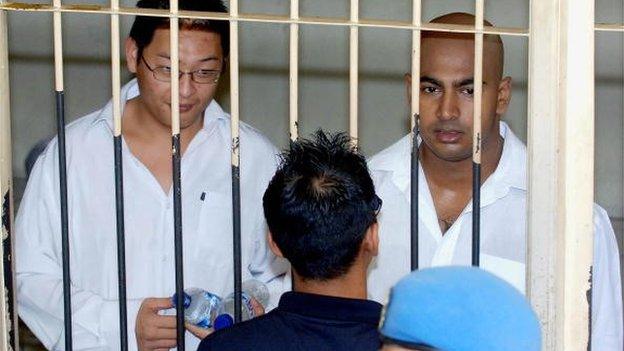Brazilian family's fight to stop execution of Rodrigo Gularte
- Published
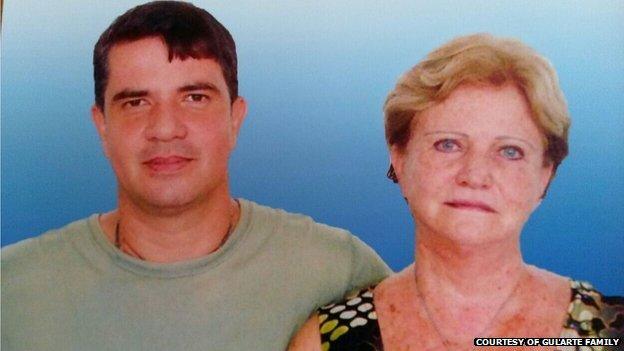
Clarisse Gularte, Rodrigo's mother, says "her heart is bleeding" for her son
It is a race against time. The family of Rodrigo Gularte, a Brazilian man on death row in Indonesia, is desperately trying to convince the authorities there he should be spared.
The 42-year-old, who was convicted for drug smuggling, is due to face the firing squad at an imminent but undisclosed date.
But his family says he has schizophrenia and in need of medical help, and should not be on death row.
Gularte spends most of his time at Nusakambangan prison alone, talking to the walls, imagining ghosts or hearing voices, relatives and friends say.
He was arrested in 2004 while trying to smuggle 6kg (13lb) of cocaine into the country hidden inside surfboards. He was sentenced to death one year later.
'Bleeding heart'
Now he is among 10 prisoners, including two Australians convicted in the "Bali Nine" drug smuggling ring, scheduled for execution.
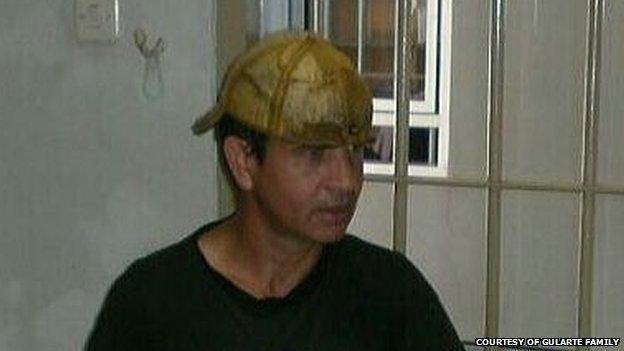
Gularte's cousin says he refuses to take off this cap, believing that it protects him
If it goes ahead, he will be the second Brazilian to be executed in Indonesia this year.
His 70-year-old mother Clarisse last saw him in February and found him disturbed.
"My heart is bleeding. He's totally depressed and only talks about disconnected things," she told BBC Brasil.
New tests
In 2014, Gularte's family hired a team of specialists who diagnosed him with paranoid schizophrenia and said he suffered from delusions and hallucinations. They recommended his transfer to a hospital for treatment.
A report by a different group of doctors last February confirmed the initial assessment.
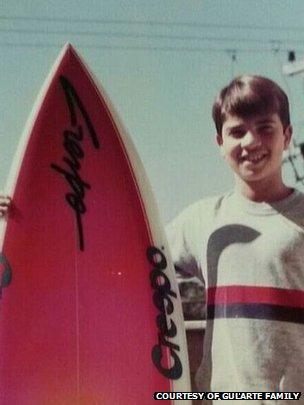
Gularte, who was a keen surfer, was born into a wealthy family
Earlier this month, the Indonesian authorities commissioned their own mental health report.
Tony Spontana, the spokesman for Indonesia's attorney general, told the BBC last week that they were waiting for the results of the report to confirm whether or not Gularte was mentally ill.
The family argues that Article 44 of Indonesia's penal code clearly states that a prisoner with a mental disorder cannot be executed.
They are desperately trying to convince the Indonesian authorities of his precarious mental health.
'The biggest mistake'
Gularte was born into a wealthy family in the southern Brazilian city of Foz do Iguacu.
A keen surfer, relatives remember him as a kind young boy who fell into depression and became involved in drugs following his parents' divorce when he was 13.
His cousin, Angelita Muxfeldt, has visited him regularly since he was arrested.
She has been in Indonesia since January trying to prove to the Indonesian authorities that her cousin is mentally ill.
She says his parents spotted the first signs of a mental illness during Gularte's teenage years.
Ms Muxfeldt believes that drugs and depression were an explosive mix which others exploited.
Gularte was detained at Jakarta airport in 2004 along with two other men.
He took all the blame for the drugs hidden inside the surfboards they were carrying and the two others were allowed to go free.
Ms Muxfeldt says her cousin "wasn't fully conscious of what he was doing". "We believe he was harassed by international traffickers because of his mental condition," she says.
"This trip was his biggest mistake," she adds.
Ghosts
Ms Muxfeldt says her cousin had no legal representation during his trial after his lawyer ran away with the money he had been paid to represent Gularte.
She says that after being sentenced to death, he attempted to take his own life.
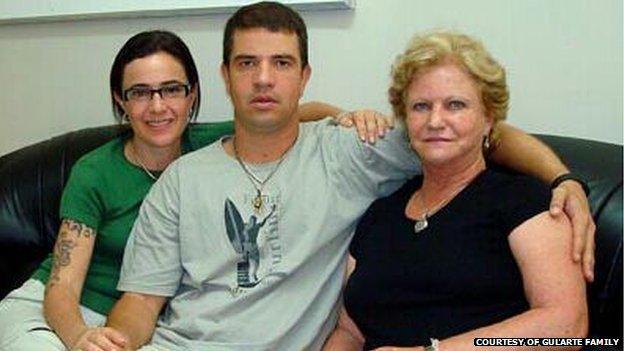
Gularte's cousin, Angelita Muxfeldt (left), and mother, Clarisse, have urged him to seek medical help
For years, the family has tried to convince him to get treatment at a prison hospital on the mainland but he refuses, arguing that he will be targeted on the way.
"He says: 'I'll be blindfolded, handcuffed. There are snipers on the island and I'll be shot dead on the way to the hospital'," Ms Muxfeldt explains.
"He stays alone and quiet all the time. He talks to himself. Nobody wants to stay with him in the cell because he talks to ghosts. He's delusional."
The BBC looks at the prison which has been called 'the Alcatraz of Indonesia', where condemned prisoners are executed by firing squad
Others who have recently seen Gularte said that he was constantly talking to walls and claimed to hear voices he believes come from satellites.
The family says he has recently lost 15kg (33lbs) because he refuses to eat out of fear the food may be contaminated.
He is also convinced he will not be executed, even after seeing his name in newspaper articles listing him among those on death row.
Ms Muxfeldt described him as a man divorced from reality: "He lives in his own world and says that all of this talk of execution is not real."
Media attention
Gularte's family have done their best to publicise his fate, hoping it will help their case.
Human rights groups have also urged Indonesia to review his sentence and human rights group Amnesty International has asked for all executions to be cancelled.
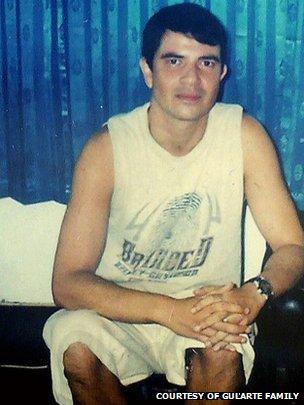
Gularte, pictured in prison, doesn't believe that he will be executed
But international pressure has had little effect in the past and relations between Indonesia and Brazil have been tense since the execution of another Brazilian convict.
Marco Archer Cardoso Moreira was executed in January for trying for trying to smuggle 13kg of cocaine into the country.
Brazil recalled its ambassador and President Dilma Rousseff recently declined to accept the credentials of the new Indonesian ambassador to Brazil.
Indonesia's President Joko Widodo argues his country is facing a "drugs emergency" and has rejected any pleas for clemency.
Meanwhile, Gularte's family fearfully awaits the outcome of the medical tests which seem to spell the only hope for the Brazilian to escape the firing squad.
"He is sick. We're not lying," his cousin pleads.
- Published8 February 2015
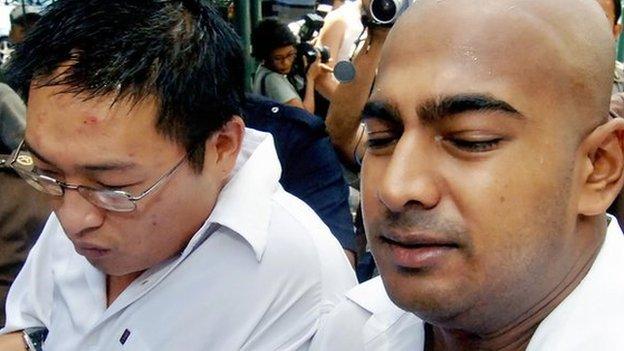
- Published5 March 2015
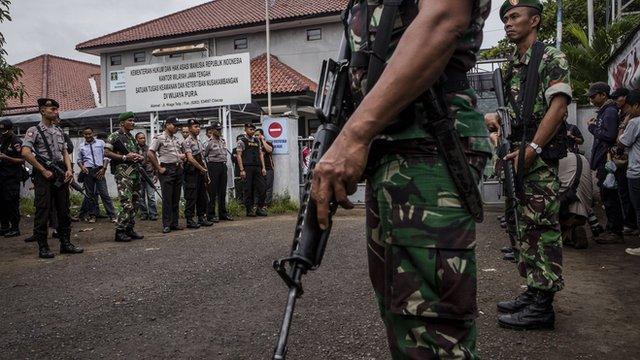
- Published29 April 2015
